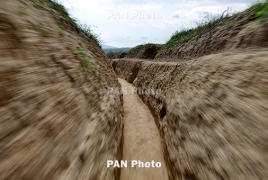AFP: Trauma, stigma plague soldiers a year after Karabakh war September 27, 2021 - 18:40 AMT PanARMENIAN.Net - Insomnia and nightmares, heart palpitations and aggression are among lingering psychological injuries that soldiers who fought in the Second Karabakh War are haunted by one year after the beginning of hostilities, AFP says in a fresh article. Thousands of veterans on both sides are suffering from post-traumatic stress disorder (PTSD) in patriarchal societies where seeking help for mental health can be taboo. Armenia and Azerbaijan are working to expand access to psychological care for former servicemen, an effort that is gradually drawing out battled-hardened veterans overcoming fears of being seen as weak. But the challenge of reaching everyone who needs help is huge. Health professionals in both countries lamented an underdeveloped culture of psychiatric treatment they said was hindering efforts to help PTSD-diagnosed veterans. "Only a quarter of war veterans agree to undergo treatment," said doctor Khachatur Gasparyan of the Intra psychological centre in the Armenian capital Yerevan. "Society has to be taught there is nothing shameful in visiting a psychologist -- that it's normal," he said. Both countries have set up psychological rehabilitation centres for veterans, former war prisoners, and families of the dead and missing. David Stepanyan, who narrowly escaped death on his first day fighting when an Azerbaijani shell blew up a car he had just got out of, is still on that road. The 21-year-old was wounded less than a month into the war and taken -- unconscious -- to a hospital, where doctors told him a sniper's bullet had pierced his flesh millimetres from his heart. The bullet is still lodged in his chest and his entire body is scarred, but it's the psychological wound he struggles with most. For months, he said, he couldn't sleep well and fragments of memories from the war would encroach into his dreams and waking hours. "I couldn't interact with family or friends and finally decided to get medical help," he told AFP. "The worst memories from the war are the moments when you see your wounded friend nearby, but can't help him because of the enemy's heavy fire," he said. But he said eight psychotherapy sessions had brought about some relief and that he now can sleep for as much as four hours a night. Not everyone makes progress. Azerbaijani veteran Asif Maharramov, who suffered a head injury and saw his captain die, now works as a security guard at an oil facility outside Baku and feels his life lacks prospects. "If I ever get married, there will be no music at my wedding party," he said. "I know people who will never marry because they died in a war." The EU does not intend to conduct military exercises with Armenia, Lead Spokesperson for EU Foreign Affairs and Security Policy Peter Stano says. A telephone conversation between Putin and Pashinyan before the CSTO summit is not planned, Peskov says. London’s Armenian community has been left feeling “under attack” after the city’s Genocide monument was vandalised. The United States believes there should be an international mission to provide transparency. Partner news |